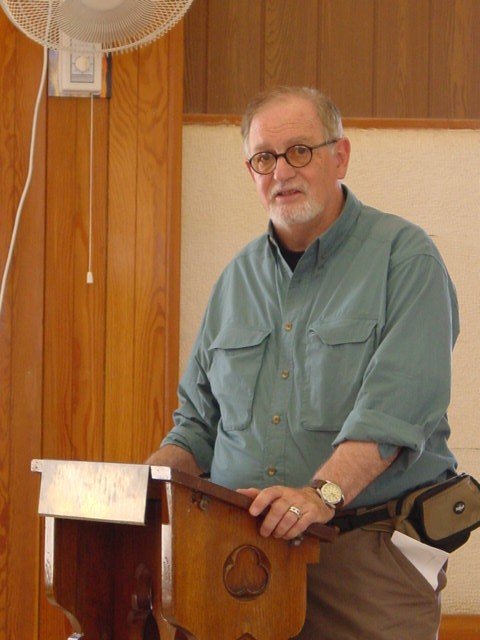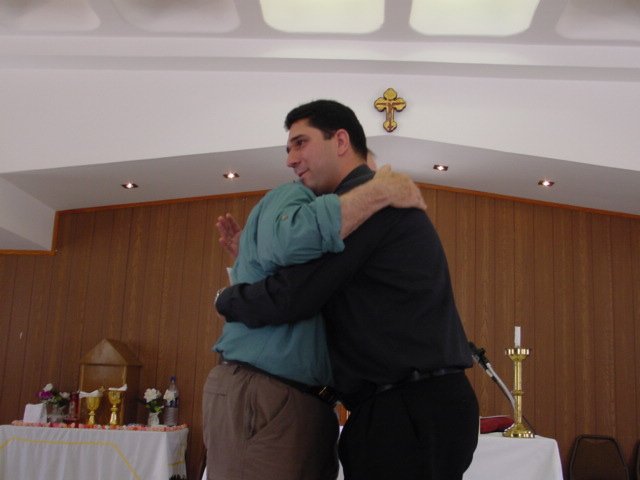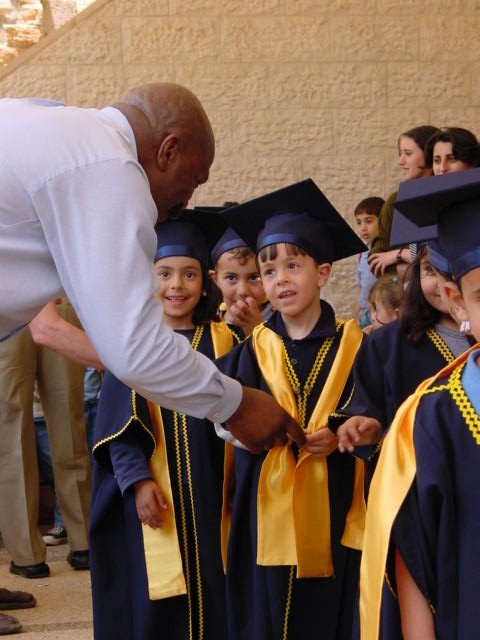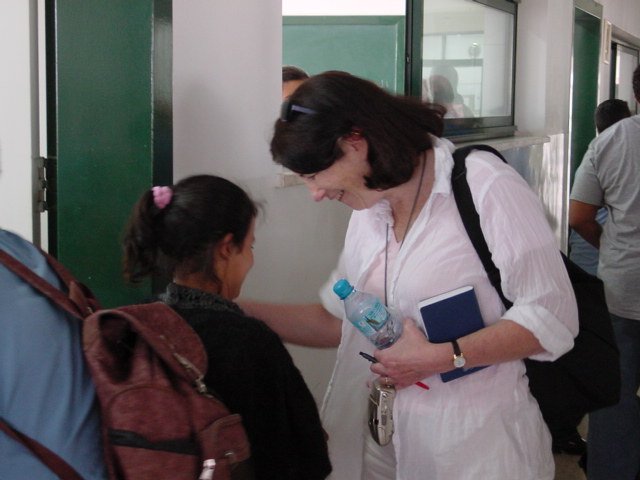May 16, 2002
Member of the Episcopal delegation addresses the group at St. Matthew’s Anglican Church in Zababdeh.
When we lived in Chicago, we had a phrase to signify small moments of grace - "the God of the parking meter" - things that aren't earth-shattering, but are wonderful, helpful small occurrences - a sign of God's omnipotence and omnipresence. Today, "the God of the checkpoint" was at work.
The Episcopal delegation furiously taking notes at St. Matthew’s Anglican Church.
Fr. Hossam welcomes the Episcopal delegation to St. Matthew’s Anglican Church.
We left Zababdeh in Abuna Aktham's car, heading down to the Tayasir checkpoint to meet the Sabeel group who were coming to visit us. They had arrived a minute or two before us, and the group leader needed to do very little negotiating. The bus, with yellow (Israeli) plates and Jerusalemite driver, entered almost immediately. The group of twenty-five American Christians, mostly Episcopalian including two bishops (Washington and Massachusetts), headed up with us to Zababdeh. Fr. Hossam was able to make it up from Nablus early in the morning and took them around the town. Our visitor from Jerusalem joined in with the group.
First stop was St. Matthew's Anglican Church, where we shared a bit of fellowship and greetings - including those from Zababdeh's sister church in the Diocese of Olympia, WA - before singing together "How Great Thou Art" in Arabic and English. We visited the Pennman Clinic, one of the outreach ministries of the Anglican church, before heading off to visit Abuna Tom'ie at St. George's Orthodox Church. He spoke of the history of the Greek Orthodox Church and of Zababdeh's churches at the "forgotten church" before singing "Al-Masiih Qam" (Christ is Risen), a traditional Byantine hymn, and leading us in prayers.
Meanwhile, Elizabeth had to slip off to teach her last class of the school year. It was a nostalgic moment for her as this group of 20 seventh-graders was her first real class (i.e. kids for whom she was the only English teacher and whom she saw every day). The kids were very sad to hear theat it was her last day with them, but a little happy to get the chocolate candy she brought them. Elizabeth will miss these kids a lot.
Fr. Thomas welcomes the Episcopal delegation to St. George’s Orthodox Church while Fr. Hossam translates.
Fr. Aktham receives the Episcopal delegation in the Latin Church.
As her class let out, the group was arriving at the school, guided through the halls by Abuna Aktham. This is the first group that has come to visit Zababdeh in a year (apart from the random individual or group of three or four people), and the kids were in full-chaos mode, standing on their desks to wave to the visitors, shaking hands with whomever would stop to do so (which they all did). It was a real treat, topped off by a quick stop in the Kindergarten where the children are getting ready for tomorrow's graduation - cute factor 10+. We shared a traditional Palestinian meal in the Anglican church hall before boarding the bus for Jenin Camp.
Kindergarten graduates being greeted by a member of the Episcopal delegation.
We were able to connect with some young men from Jenin who know the story of the Camp quite well and were glad to bring visitors there. The group was clearly stunned by what they saw, as most people are. Some commented that they were sickened - an appropriate reaction when you're talking to people who are pointing to where their homes used to be and telling tales of the fear. More than one person broke down in tears as they talk about the affect on their children, their spouses, themselves. We parted company with them, promising to see some of them in Boston and Maine this summer, sending them off to Nazareth as we headed back to Zababdeh.
A girl practices her English with a member of the Episcopal delegation at the Latin School.
Episcopal group surveys the damage in Jenin Camp.
It was a long, exhausting day, but wonderful - the schedule gelled well, the group was enthusiastic and pleased, and it was a long-overdue chance to show of the area of Zababdeh that we've come to know and love. There is so much more to see, including the Christian communities in Tubas, Jenin, and Burqin, not to mention the Arab-American University of Jenin, but for six hours, we saw quite a bit. We look forward to doing it again soon.
The Episcopal delegation surveys the damage in Jenin Camp.
On the road back, we got a call that we should be careful - tanks were parked on the road between Misilye and Zababdeh. The traffic coming the other way gave us the same warnings. Sure enough, we could see the path two tanks had carved through what used to be someone's field of hummous, one of them pointing their barrel directly at the on-coming traffic (that is, us). That's the absurdity of this place - we were having some banal conversation, stared down the tank barrel, and then returned to our banal conversation as if passing a tank barrel were just simply a normal daily occurrence.
Marthame and our friend headed up to the University's coffee shop to visit with friends of his who had come up from Jerusalem. The conversation was fascinating as we left behind the controversy and emotion of political conversations for that of religion - those who see Islam as a monolithic faith would be lucky - as we have been - to have such encounters and see the variety of opinion and practice in the Muslim world.
When we were all back home, we could hear the sound of a tank shell being fired in the distance - again, a banal conversation was interrupted only to be continued immediately. Heek hayatna ("that's our life" - the Arabic equivalent of c'est la vie).









